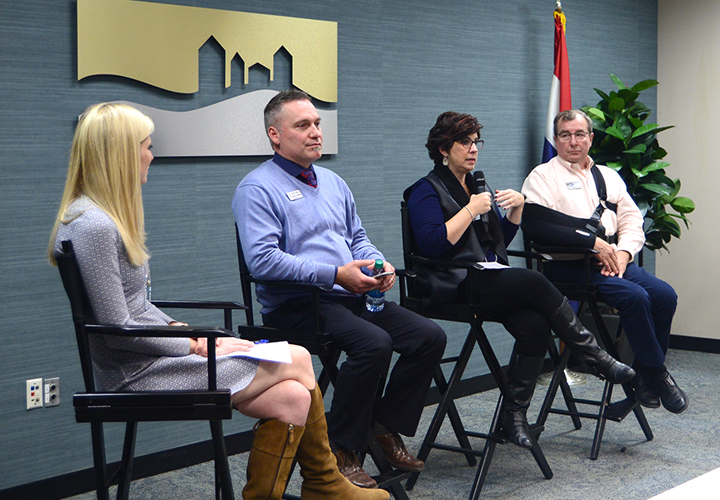The importance of learning by doing

When it comes to finding the right job, for many people the best approach is the hands-on approach.
It’s been true for centuries. From apprenticeships to internships, many of the most trusted and long-standing career fields are built on the idea that those entering the profession should learn directly from those who know it best – and they should learn by doing.
In the current field of workforce development, it often carries a new name: experiential learning. But as a panel of business, community and education leaders shared when they visited the Chamber on November 8, the idea is the same.
“The old saying is, ‘If I hear, I forget. If I see, I remember. If I do, I understand.’ That sums it up best,” said Greg Herren, general manager for stainless steel manufacturer Multi-Craft Contractors. “There are a lot of things you can do in a career that are book-based, but when it comes to many of the trades or more intricate careers, until you experience doing it, you’ll never master it. How many people would want a surgeon who hadn’t been an understudy at least for a little while?”
Herren and his co-presenters – Tammy James, human resources supervisor with City Utilities, and Dr. Shawn Randles, superintendent of Logan-Rogersville R-VII School District – all said that the idea of experiential learning is not new. But there is renewed focus on it because of the dire shortage for skilled workers, especially in the trades.
“We’re at a generation now where we’re missing those people who want to be craft workers, people with technical skills,” James said. She added students who visit the utility are surprised by the variety of jobs available, from linemen and installers to accountants, IT and economic development. “Hands-on learning gives people the chance to see what’s out there.”
It also means that a one-size-fits-all approach won’t work, especially, Randles said, for high school students who aren’t sure what the future might hold.
“We parents, myself included, have failed a generation of kids. We want our kids to have a better life than we do – and we all thought the way to do that was to go to college. But that’s not always the case,” he said. “Not every kid is cut out to go to college, and not every high-paying, rewarding job requires a college degree. We need to let kids test-drive their future and see their potential future career paths, so they can find their passion.”
In a school setting, that means customized educational approaches; Logan-Rogersville’s programs run the gamut from college prep to supervised job shadowing and internships to students who leave school early to work part-time jobs to the GO CAPS program. All seniors do one day of job shadowing, and those who apply in person for a job or college get special recognition at graduation.
Employers create opportunities in the workplace as well. CU has created its own apprenticeship and co-op programs. Catherine Bass, panel moderator and vice-chair for workforce development on the Chamber board, said her employer, Bass Pro Shops, hosts teachers through the GO CAPS teacher externship program, exposing classroom teachers to the career options available for their students in a business setting. CU and Multi-Craft participate in the externship program as well.
Herren said that even though internship and training programs can be expensive and time-consuming, it’s an investment his company couldn’t afford not to make.
“We’re a for-profit company, and sometimes it can feel like things we do that aren’t focused on profit are a distraction. But the owners defined our five core values, and one of them is giving back to the community that has so enriched us – because it’s wise to invest,” Herren said. “Our leadership is very astute about the labor market, and they see what’s coming and knew we needed to make the investment. If you don’t work for a company that has that corporate culture and core values, you may not be working for the right company.”
Randles agreed – and he said there is no time to waste.
“We can’t continue to think the same way and expect different results, assuming things will be different when you do things the same way – I call that ‘assumicide,’” he said. “We know where we want to go and what the goal is … but we’re building the plane while it’s in the air already.”

